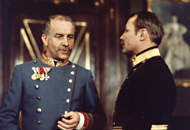the Id and the Ego
In his theory of psychoanalysis, Freud basically states that sexual drive (the "id") is at the basis of all human actions. I see a lot of this theory demonstrated in Schnitzler's "Dream Story". At many instances, Fridolin's actions are definitely irrational. Schnitzler clearly suggests the working of sexual drives behind these actions.
For example, when Fridolin is told by the mysterious lady to leave the party at once, he responds to her "No,... life is no longer worth anything to me if I have to leave without you," even though he didn't even know who she was. This seems like an extreme case where Fridolin's action is ruled by the Id rather than the Ego. Also, the unsatisfied and repressed sexual drive at this instance leads him to keep wanting to go back to her. Fridolin connects the deceased Baroness D. with the mysterious lady, without any concrete backing, as if trying to convince himself that his "love" with the mysterious girl is concluded with her death. He wants to see her again, but at the same time, he probably does not want to get into any deeper trouble. You could almost see the battle between consciousness and sexual desire.
The interesting connection between Freud's psychoanalysis and Schnitzler's "Dream Story" is that Shnitzler does not simply introduce sexual desire as the only drive. It is dominating, but Shnitzler does not forget to show battle between rationality, coexistance of sexual desire (for women Fridolin encounters) and desire for stable life (with his wife), etc. In "Dream Story", Sexual drive is the foundational drive, just as Freud explains, but not the one-and-only drive.



1 comment:
Do you see this woman as representing someone else, perhaps Albertine? Does his plea make more sense if we imagine the Baroness as a doppelganger of Albertine? He selects the "Baroness" from a wide variety of "types" of nude women at the party, much as a man does when choosing a mate. She approaches him, warning of danger and then offering herself. Isn't there a wish fulfilled by her death if we imagine her as a double for Albertine? Is his search for the Baroness Fridolin's sublimation of his perceived loss of Albertine after her confession?
Post a Comment